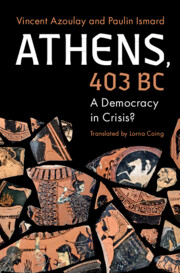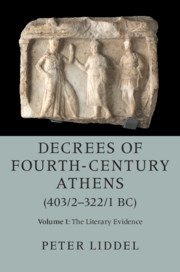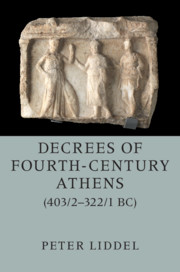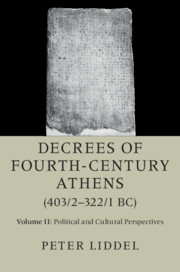Athens, 403 BC
At the end of the fifth century BC, the Peloponnesian War resulted in Athens' shattering defeat by Sparta. Taking advantage of the debacle, a commission of thirty Athenians abolished the democratic institutions that for a century had governed the political life of the city and precipitated a year-long civil war. By autumn 403 BC, democracy was restored. Inspired by the model of the ancient chorus, this strikingly innovative book interprets a crucial moment in classical history through the prism of ten remarkable individuals and the shifting groups which formed around them. The former include more familiar names like the multifaceted Sokrates, the oligarch Kritias and the rhetorician Lysias, but also lesser-known figures like the scribe Nikomachos, the former slave Gerys and the priestess Lysimakhe. What leads a community to tear itself apart, even disintegrate, then rebuild itself? This question, explored through profound reflection on the past, echoes our tormented present.
- Offers a fresh and innovational interpretation of a key event in Athenian political history: the civil war of 404/403 BC and the refoundation of democracy
- Creative reflections on the past are now seen to have much contemporary resonance
- Boldly and controversially argues for sustained reflection on the necessary nature of conflict within any democratic regime
Reviews & endorsements
'In Athens 403BC Azoulay and Ismard have produced a superb study of the critical period defined by the brief ascendancy and rapid fall of the Thirty in the aftermath of Athens' defeat in 403 BC. This is an original study with a distinctive voice and a compelling thesis.' Jeremy McInerney, University OF Pennsylvania
'Homonoia (Unanimity) and Diallage (Reconciliation) were 5th-century BCE Athenian democratic catchwords but they still resonate today, as perhaps never before. How timely then is this brilliant collaborative investigation of plurality, polyphony and dissonance in the world's first democracy. Let me only add my voice to the chorus of praise that is its due.' Paul Cartledge, University of Cambridge
Product details
December 2024Adobe eBook Reader
9781009490986
0 pages
2 b/w illus. 3 maps
Not yet published - available from December 2024
Table of Contents
- Introduction. Towards a choral history
- 1. Critias and the oligarchs
- 2. Thrasybulus and the democratic resistance
- 3. Archinus or the victory of the 'moderates'
- 4. Socrates and the voices of neutrality
- 5. Lysimache: the priestess of Athena and her doubles
- 6. Eutherus and the precarious workers
- 7. Hegeso or the family torn asunder
- 8. Gerys and the world of the merchant agora
- 9. Nicomachus and the servants of the city
- 10. Lysias, a multi-faceted man
- Conclusion. The city in chorus.






